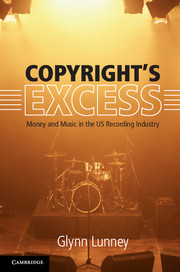
-
Select format
-
- Publisher:
- Cambridge University Press
- Publication date:
- 29 March 2018
- 12 April 2018
- ISBN:
- 9781316855140
- 9781107181670
- 9781316632796
- Dimensions:
- (228 x 152 mm)
- Weight & Pages:
- 0.47kg, 248 Pages
- Dimensions:
- (228 x 152 mm)
- Weight & Pages:
- 0.36kg, 248 Pages
You may already have access via personal or institutional login
Book description
For more than two hundred years, copyright in the United States has rested on a simple premise: more copyright will lead to more money for copyright owners, and more money will lead to more original works of authorship. In this important, illuminating book, Glynn Lunney tests that premise by tracking the rise and fall of the sound recording copyright from 1961–2015, along with the associated rise and fall in sales of recorded music. Far from supporting copyright's fundamental premise, the empirical evidence finds the exact opposite relationship: more revenue led to fewer and lower-quality hit songs. Lunney's breakthrough research shows that what copyright does is vastly increase the earnings of our most popular artists and songs, which - net result - means fewer hit songs. This book should be read by anyone interested in how copyright operates in the real world.
Reviews
‘Lunney convincingly shows that an intuitively plausible account of copyright's dose-response effect on music production is inaccurate, and that the economic story is far more complicated. By asking us to focus on the marginal artists, not the greatest hitmakers, he productively challenges copyright maximalism as well as some varieties of minimalism. Anyone interested in the music ecosystem, or in the economics of creativity, will learn a lot from this book.'
Rebecca Tushnet - Frank Stanton Professor of First Amendment Law, Harvard Law School
‘A must read for anyone interested in the relationship between copyright law and good music. Lunney combines the firepower of a Ph.D. economist, the incisive thinking of a trained lawyer, and the passion of a music lover in a book that is both eminently readable and scholarly.'
Paul J. Heald - Richard W. and Marie L. Corman Research Professor of Law, University of Illinois College of Law
‘Glynn Lunney presents a comprehensive history of the economics of modern music, all pointing to a striking conclusion: the more money musicians make, the less music they make. His data upends the traditional copyright story. Along the way, we learn any number of facts about the music world, including which artist has the most top-100 hits in the first decade of their career (hint: the Beatles are number 2). Highly recommended.'
Mark A. Lemley - William H. Neukom Professor, Stanford Law School
‘Through patient and inventive analysis of industry data, Glynn Lunney shows that more copyright does not produce more or better music – and that in fact it may produce less. It may be that the proponents of ever-increasing copyright will remain unconvinced. But they will have to confront Lunney's work.'
Christopher Jon Sprigman - New York University School of Law
'Copyright’s Excess is foundational work in the economics of intellectual property.'
Source: Jotwell
Contents
Metrics
Altmetric attention score
Full text views
Full text views help Loading metrics...
Loading metrics...
* Views captured on Cambridge Core between #date#. This data will be updated every 24 hours.
Usage data cannot currently be displayed.
Accessibility standard: Unknown
Why this information is here
This section outlines the accessibility features of this content - including support for screen readers, full keyboard navigation and high-contrast display options. This may not be relevant for you.
Accessibility Information
Accessibility compliance for the PDF of this book is currently unknown and may be updated in the future.


